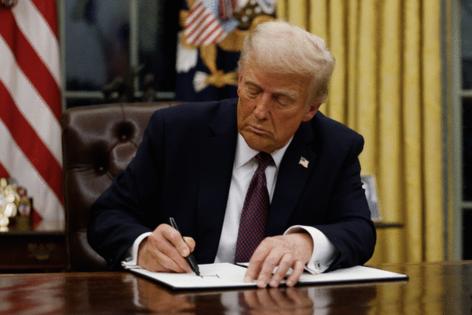In punishing Colombia, Trump makes unprecedented move tying sanctions to immigration policy
Published in News & Features
When President Donald Trump announced immediate reprisals against Colombia on Sunday after President Gustavo Petro refused to allow two U.S. military flights carrying deported Colombian migrants to land in the South American nation, his decision to directly tie sanctions to immigration marked an unprecedented shift in foreign policy.
“This is an unprecedented situation — one we’ve never faced before. We’ve never seen U.S. sanctions tied directly to migration policy, underscoring just how high a priority this administration is placing on migration,” said Geoff Ramsey, senior fellow at the Atlantic Council, an American think tank specializing in international affairs.
The measures included a 25% tariff on all Colombian products—set to rise to 50% within a week—and the closure of the visa section at the U.S. Embassy in Bogota.
Deportations of undocumented immigrants have been under way since Trump took office, following the signing of several executive orders aimed at halting illegal entry into the United States, particularly along the U.S.-Mexico border.
Trump promised during his campaign to carry out mass deportations and to dismantle programs introduced by the Biden administration, including humanitarian parole for Cubans, Haitians, Nicaraguans, and Venezuelans.
Ramsey, an expert on U.S. policy toward Colombia and Venezuela, said Petro made a mistake by directly challenging Trump.
“Petro will have to soften his stance as a result,” Ramsey said.
And he did. Following Trump’s announcement of sanctions and tariffs on the Truth Social platform, Colombia responded by offering Petro’s presidential plane to ensure a “dignified” return for Colombians to their home country. However, Petro later declared that Colombia would also impose a 50% tariff on American products in retaliation.
Ramsey anticipated that the economic impact of U.S. sanctions on Colombia would be substantial, a view shared by Maria Claudia Lacouture, former Colombian Minister of Commerce, Industry, and Tourism, who is now the executive president of the American Colombian Chamber.
Lacouture said on her X account that if the U.S. imposes emergency tariffs on Colombian products, “the impact will be immediate and devastating.”
In a video on X, Lacauture also said that the relationship between Colombia and United States is at its most critical moment in decades.
“We call for diplomatic channels to be implemented to overcome the crisis,” she added. ”The well-being of Colombia is at stake.”
The U.S. is Colombia’s largest trade and investment partner, with over $39.3 billion in bilateral trade in goods and services in 2022, driven by significant investments in the mining and manufacturing sectors, according to the State Department. Colombia ranks as the U.S.’s third-largest trade partner in Latin America, and U.S.-owned affiliates in Colombia support more than 90,000 jobs.
“It’s a completely new scenario. The sanctions announced could even be harsher than those imposed on neighboring Venezuela, depending on the details, particularly whether they involve general sanctions, which would have a significant economic impact on Colombia,” Ramsey said.
However, he thinks it’s unlikely the sanctions will fully materialize fully, because they would also negatively affect U.S. consumers. Valentine’s Day is just over two weeks away, and Colombia is a major exporter of flowers to the U.S.
“It’s questionable whether American consumers would be willing to pay 50% more for flowers for Valentine’s Day,” he said.
Christine Boldt, executive vice president of the Association of Floral Importers of Florida, told the Miami Today News last year that Colombia is the leading source of flowers to South Florida, supplying 60% of the flowers that arrive in Miami by air or sea, while Ecuador accounts for around 25%. The flower industry in South Florida employs approximately 6,000 people, with 90% of the fresh-cut flowers entering the U.S. market passing through Miami International Airport.
©2025 Miami Herald. Visit at miamiherald.com. Distributed by Tribune Content Agency, LLC.







Comments